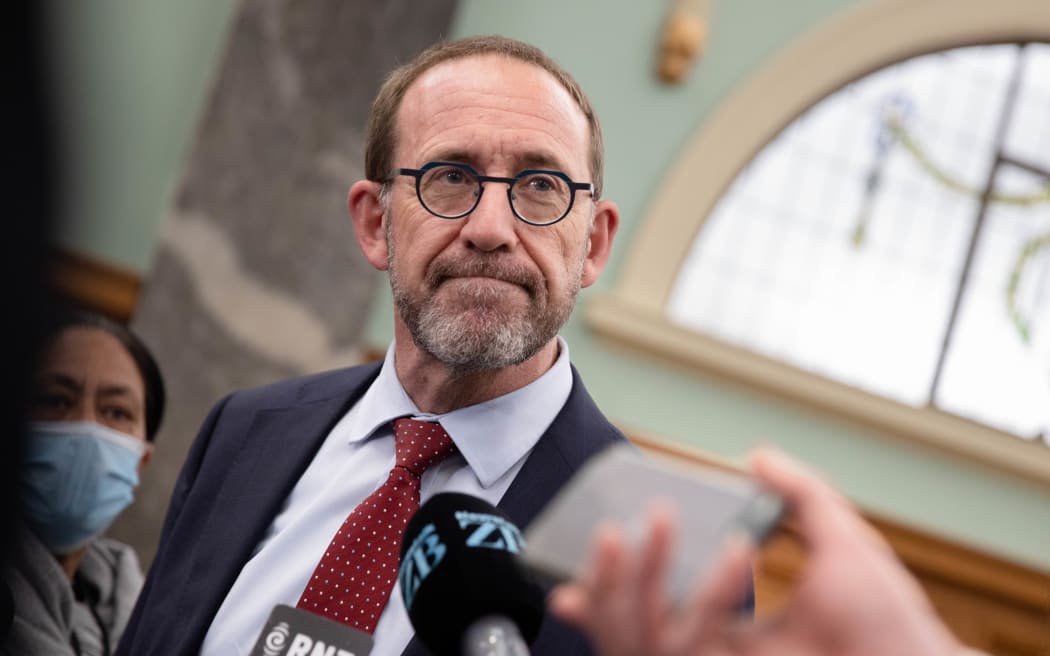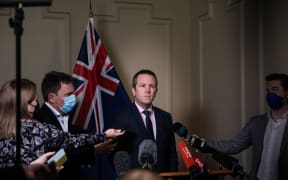A letter signed by all 20 DHBs shows the government was warned of an impending staffing crisis almost a year ago.

Minister of Health Andrew Little said he only became aware of the letter when it was released in an OIA request a couple of months ago. Photo: RNZ / Angus Dreaver
Health leaders told officials a year ago the sector was on the brink of falling over if overseas staff were not incentivised to work in New Zealand.
A letter signed by all 20 District Health Boards requested urgent changes to immigration rules to meet the impending workforce shortages.
Sent in July last year, it was written by Hawke's Bay DHB chief executive Keriana Brooking and addressed to Ministry of Business chief executive Carolyn Tremain.
"You will be aware that our hospitals are also experiencing very high levels of occupancy at present and some sites are even in "code red" where they are deemed to be at extreme levels," she wrote.
"This is obviously an unsustainable situation and places even more pressure on our existing workforce."
"We are very concerned about this situation and for the potential for further deterioration if there are no changes to assist with at least securing the existing workforce."
The letter pleaded for current overseas staff to be given a more direct path to residency, and for overseas workers to be better facilitated to enter Aotearoa.
She said these were necessary steps to avoid a health crisis.
The letter outlined the pressure on hospitals, with DHBs regularly reaching 90 percent capacity in their emergency departments.
"DHBs are currently experiencing increased admissions to hospitals with a flow-on impact to ICU."
"We are also experiencing increased presentations in emergency departments."
National's health spokesperson Dr Shane Reti said the lack of action following the letter showed a failure of Health Minister Andrew Little's responsibility to ensure health care was available to everyone in New Zealand.
"After receiving the letter warning of a looming storm about to hit the health sector, Andrew Little decided to ignore it and pushed on with his health restructure," he said.
"Now we are dangerously 4000 nurses short and have a health sector slowly falling apart at the seams."
But Little this afternoon said Reti was wrong, and was mixing up the letter's specific concerns about MIQ with general concerns about the health workforce.
"Shane is very good at going on these sort of John Le Carre escapades for things that don't exist. And so he's got a letter that the DHB chief executives sent to MBIE because of the problems they were having with MIQ - but that was the extent of it."
He said he only became aware of the letter when it was released in an OIA request a couple of months ago, and when he found out about health employers' struggles to get workers across the border in October he stepped in to guarantee them access to 300 MIQ rooms a month.
"Even though, during the course of the Covid pandemic, we'd had well over 5000 health workers across the border, certainly by last year the health employers were finding it difficult to secure places.
"I was helping health employers including DHBs getting people across the border. It became apparent to me after about the third time I had to help somebody that the claim that there were guaranteed places for health workers in the MIQ system was not real, and we set about fixing that so that by October last year we then had a guaranteed 300 places a month."
The global labour market was "incredibly competitive", he said, and the government was doing everything it could.
"We're queuing up with pretty much every other country to get who we can to work in the health system and we're doing the long-term stuff too: backing more nurses to get back into the profession, backing more other medical professionals to get back into the jobs they want to do.
"I'm confident that everything that can be done is being done at the moment."
He said staff absenteeism was contributing to further pressure in recent weeks.
"The DHBs tell me that they've had levels of staff absenteeism that are at levels they'd never seen before. So for example one hospital told me 15 percent on a particular day last week - that compounds the problem with the vacancies we've had.
"I don't think the vacancies have got any worse, there's been a constant effort to recruit new health workers into the vacancies but then on top of that we've got the spike in flu infections that we've seen since the beginning of this month, that has all compounded."
He said while some hospitals were "really feeling it" he was satisfied the health system as a whole was managing.
The DHBs come under the new nationwide entity Health NZ on Friday.




